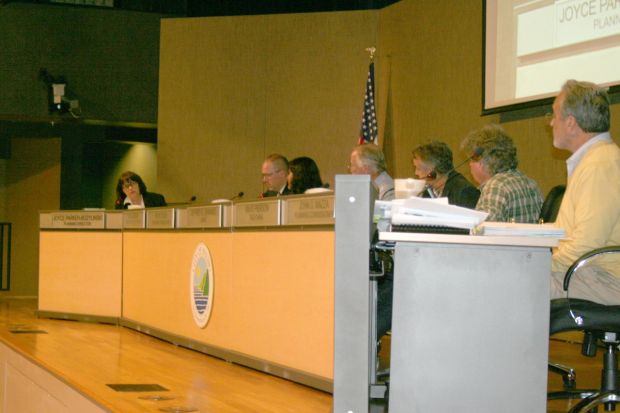
The Malibu Planning Commission by a 3-2 vote on Monday passed a significantly watered down Formula Retail Ordinance restricting the number of chain stores in the Civic Center, with a majority of the commissioners citing the potential for legal challenges as the reason for removing certain restrictions.
The key provisions of the ordinance, as adopted Monday night, are that it would limit chain retail businesses with 10 or more stores in the United States to only 45 percent of a given shopping center in the Civic Center area of Malibu. They also approved a sunset clause on the ordinance, in which the ordinance would expire after the passage of design guidelines for the Civic Center by the City Council.
But certain provisions in the original draft ordinance were removed, including a 3,500 square foot cap on the size of formula retail businesses, or chain stores. A requirement that any chain store first obtain a conditional use permit (CUP) from the city planning commission was also removed prior to the meeting, at the recommendation of the City Council.
Commissioner John Mazza, who along with commission chair Mikke Pierson objected to the removal of the 3,500 square foot cap, argued that the cap would prevent chain retailers from putting in stores such as the 10,000-square-foot Urban Outfitters shop on Cross Creek Road that command much higher rents than local, community-serving businesses can.
“If this ordinance goes in [with the 3,500 sq. ft. cap], [larger retailers] wouldn’t happen anymore,” Mazza said. “That would be three stores. And there would be a chance for local-serving, non-retail stores to be in there.”
Mazza said the commission should not be worried about a court challenge to the ordinance based on the argument that a 3,500 square foot cap violates the commerce clause by discriminating against national retailers in favor of local stores. He named other cities with formula retail ordinances as examples.
“San Francisco’s never been sued, Solvang’s never been sued, the west side of New York is now a formula retail ban, it’s never been sued,” Mazza said. “These are big cities, they’ve never been sued… Now every single guy that comes before us, there’s the potential for a lawsuit. We’re supposed to pass on that because they might sue us?”
But a majority of the commission cited a 2008 case in Florida, Island Silver & Spice Inc. v. Islamadora, as a precautionary example. In that case a federal judge ruled that Islamadora, a community of islands off the Florida coast that had passed a formula retail ordinance to preserve local character, violated the commerce clause and discriminated against a company, Island Silver & Spice Inc., whose attempts to sell its property to a developer fell through after the developer pulled out upon learning he could not build a Walgreen’s on the property due to the ordinance.
“The justification for the [Malibu] formula retail ordinance is the prevention of sameness and standardization. That’s what the law allows you to use as justification,” Commissioner Jeff Jennings said. “Ordinarily when there is a challenge, the courts allow local deference… in the Florida case, [the judge] just ignored [that].”
Commissioner David Brotman also said concerns over legal challenges convinced him to recommend the council remove the cap.
“The reason the city is undertaking this ordinance, at least that’s what the ordinance says, has nothing to do with whether formula retail is forcing nonformula retail out of business,” Brotman said Tuesday in an interview with The Malibu Times. “It’s about sameness and familiarity. That’s what the ordinance is trying to fix. There may be individuals who think the formula retail is forcing mom and pops out of business, and for all I know they may be right, but the city does not have the right to exclude a certain kind of tenant for another kind of tenant. That’s a constitutional issue.”
Commissioner Roohi Stack also argued that large retailers such as Urban Outfitters fill a local demand.
“I just want to say that Urban Outfitters does meet a demographic that’s relevant in Malibu, and that’s Malibu High School girls,” Stack said. “They found a place in Malibu that’s affordable to shop, as well as Banana Republic.”
The ordinance will come before the City Council at a future meeting for final approval.
Meanwhile, residents and activists such as community coalition Preserve Malibu have been fanning out across Malibu during the past week in a movement to gather the required number of signatures to place a separate formula retail ordinance on the November ballot. The ordinance, funded by a group headed by director Rob Reiner and his wife Michele Singer Reiner, is expected to propose highly restrictive measures to limit chain stores.
